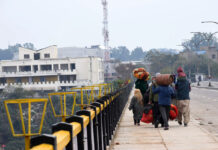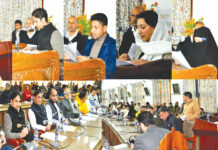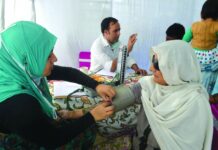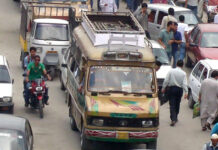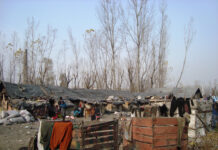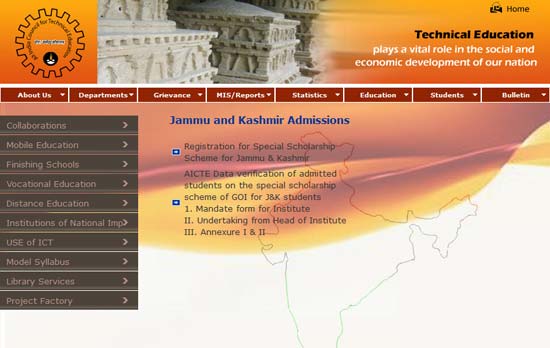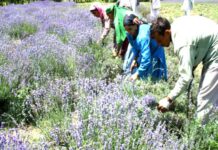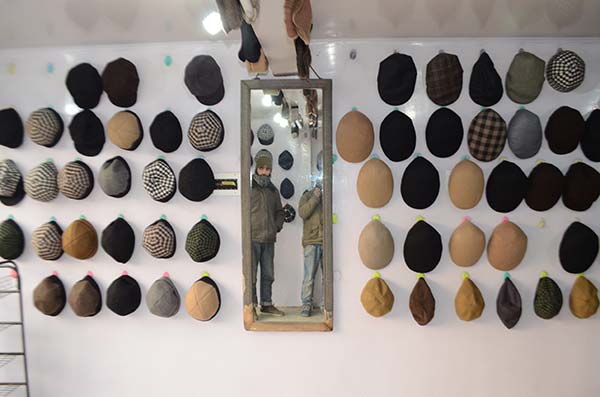Ferrying patients to the hospitals may be a tough job in conflict ridden Kashmir some ambulance drivers are paid peanuts, putting the future of their families in jeopardy. Ikhlaq Qadri reports.
For the last six years Shamas-ud-Din has been working round the clock, evening putting his life on the line. But even with so much of hard work he is unable to feed his family well. His job of transporting patients in strife-torn Kashmir as a government ambulance driver does not exude any hope of better future for him or his family.
 Shamas-ud-Din, who hails from Dangiwacha, is one of these 235 ambulance drivers with the health department who are paid just Rs 1500 (US$33) a month for their services which are usually required round the clock. The nature of their job demands that they be available in the hospital at any time of the day or night. These drivers are paid from the local hospital development fund.
Shamas-ud-Din, who hails from Dangiwacha, is one of these 235 ambulance drivers with the health department who are paid just Rs 1500 (US$33) a month for their services which are usually required round the clock. The nature of their job demands that they be available in the hospital at any time of the day or night. These drivers are paid from the local hospital development fund.
“The meagre salary is paid infrequently. Sometime we can’t cash the cheques for months as there is no money in the account,” he says.
However, up to last year they were not paid at all. They say that it is only from the last year they are being paid otherwise they were made to work for free, even when they have to remain present at the hospital round the clock.
“We are present during night and take patients to hospitals,” said driver Muhammad Yousuf.
The government, in a bid to boost healthcare, procured many ambulances during the last decade but did not appoint drivers to run them. Most of the drivers have been recruited locally.
The drivers allege that since year 2002 the only “thing they have been getting” are the “assurances of their services being regularised”. The drivers accuse the ministers and legislators for their plight.
“This all is being done by ministers and MLAs,” said Muhammad Ramzan, another ambulance driver, who is paid from the Hospital Development Fund.
However, the drivers often try to meet the ministers and other legislators to request for redressal of their woes.
Shamas-ud-Din claims that he sold rice from his family’s stock to raise money to go to Jammu to meet the minister there. But could not get through to the minister.
“They told me, that he is busy in a meeting,” he says.
However, the drivers say, they have been appointed by different legislators and ministers, and at different time, when they have met them, they gave assurances to “do something”.
“We approached Sager Sahab. He said that he will do something to help us,” said Muhammad Ramzan.
“A senior minister from central Kashmir employed 15 drivers without thinking about their future,” said Muhammad Yousuf.
However, they hailed the PDP leader Javed Mustafa Mir who according to them raised their issue in the legislative assembly and asked the government to stop their services if they were not needed but pay them as regular employees for the services they have rendered.
The health department advertised some vacancies for drivers, interviews for which were held in 2008. The HDF drivers also applied for the post but were not selected.
“We had experience and fared well (in the interview) but the authorities ignored us and selected freshers,” said Shabir Ahmad.
Though driving at odd times in a conflict zone is always dangerous, the ambulance drivers have a harrowing time, when the things get a bit overboard.
During the 2010 summer unrest scores of ambulance drivers were assaulted and injured while performing their duties.
“I was dragged out of ambulance and beaten ruthlessly. The thrashing broke my limbs and left me unconsciousness for three hours,” said Yousuf.
In a few instances during the last summer unrest, ambulances were fired upon.
Driver Farooq Ahmad said that his colleague from Pattan had a miraculous escape in one such incident. “Bullets were fired indiscriminately on his ambulance. He received injuries in legs. A bullet got stuck in back of his seat, otherwise it would have pierced his neck,” he said.
The unrest, they say, was just one bad period in which transporting patients was a challenge. “We have worked round the clock in difficult circumstances such as after 2005 earthquake, Waltengu disaster, Khundru (ammo depot) blast in south Kashmir, 2008 Ragda agitation, Shopian incident, Cholera outbreak in 2010,” they say.
Habibullah who is working in Khan Sahab block says he could not get much sleep for a month during the cholera outbreak in Budgam district last summer.
 “During every calamity we are told (by the authorities) that we will be given permanent jobs after it is over, but help to sustain the system. We did but then we were not even heard after the incident,” said Shamas Ud Din.
“During every calamity we are told (by the authorities) that we will be given permanent jobs after it is over, but help to sustain the system. We did but then we were not even heard after the incident,” said Shamas Ud Din.
Muhammad Yousuf said that in recent unrest there was a marriage ceremony in his home but he could not attend it as he was busy with his official duties.
“I missed marriage (ceremony) for the call of duty and have no regrets, but it hurts when we see indifferent attitude of officials.”
The fraternity of HDF drivers complained about the apathy of officials.
“The director told us that I have convened three meetings in this regard, but on media he vehemently denied our appointments,” said Muhammad Yousuf.
The Director Health Kashmir Dr Muhammad Amin told Kashmir Life that these “appointments contradict all norms”.
“Government has a policy to regularise and give pay hikes. They don’t come in it. HDF is no appointment at all. They might be under Rogi Kalyan Samiti (RKS),” he said.
However, the director acknowledged that the drivers have rendered their services in difficult times and trying circumstances.
“I have collected information about them. I will take up (the matter) with the government and do whatever I can to help them,” he said.
The minister for health could not be contacted.
The drivers, meanwhile, have threatened to take extreme steps if their grievances are not looked into.
“We have lost everything. We can take any step for which responsibility will be on the shoulders of the government,” said Shamas ud Din.
The drivers demanded that if every engagement like that of Rehbar-e-Taleem, Rehbar-e-Zirat has “fixed timeframe for regularisation, then why not in their case”.
“Let government come up with a concrete plan. We too are human beings. We too have families to feed and children to look after,” Shamas Ud Din said.


